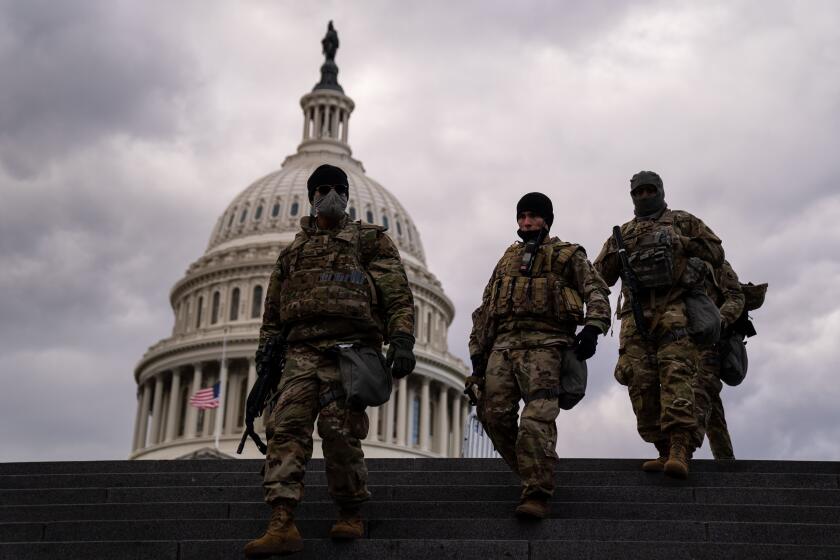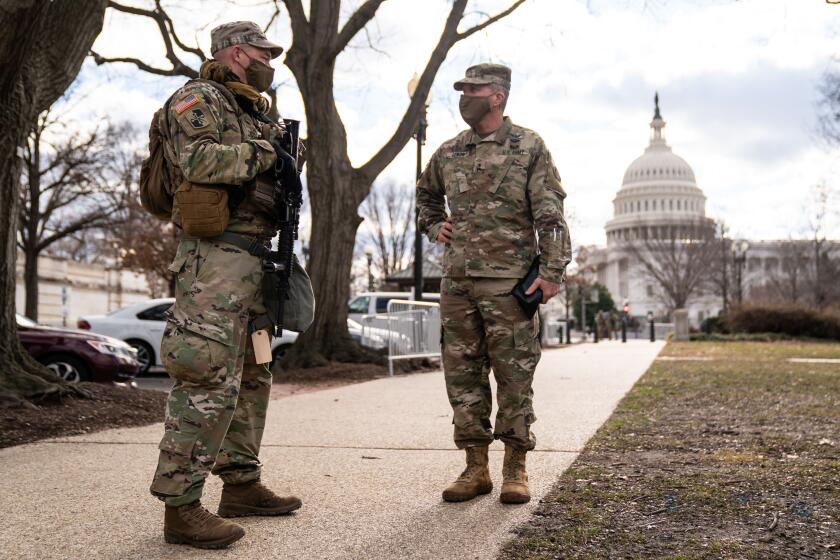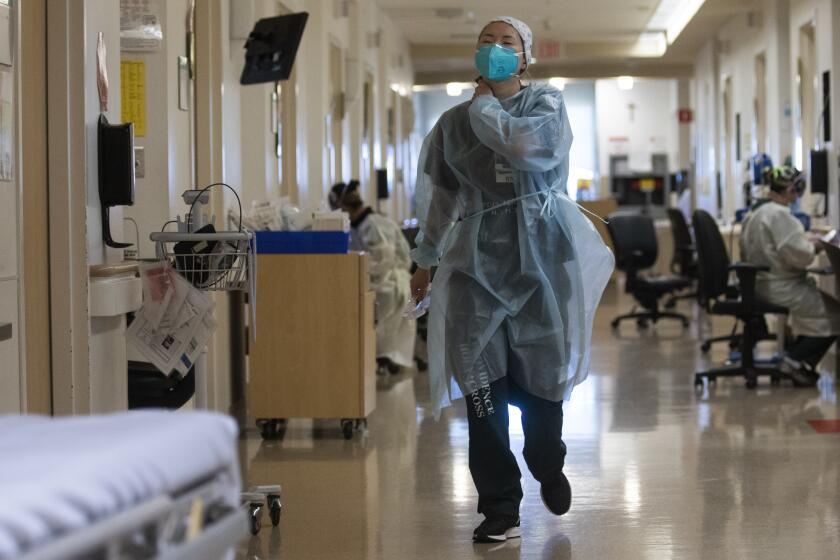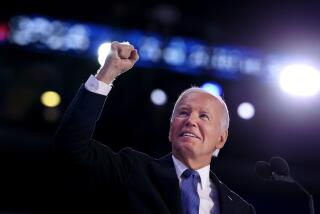Biden honors dead at COVID-19 memorial ahead of inauguration
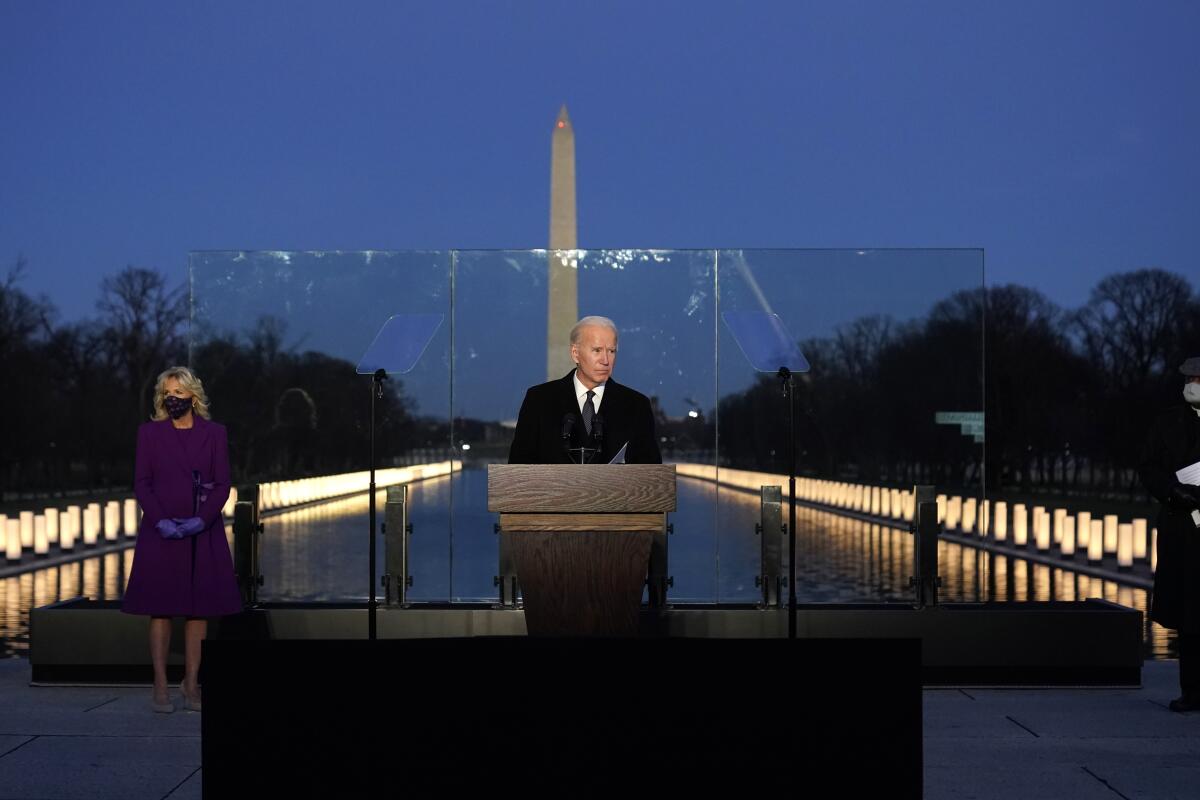
- Share via
WASHINGTON — President-elect Joe Biden made a sober entrance to the nation’s capital Tuesday, ready to assume power as America reels from the coronavirus pandemic, soaring unemployment and grave concerns about more violence as he prepares to take the oath of office.
Biden, an avid fan of Amtrak, had planned to take a train into Washington ahead of Wednesday’s Inauguration Day, but scratched that plan in the aftermath of the Jan. 6 insurrection at the U.S. Capitol.
He instead flew into a military airbase just outside the capital on Tuesday afternoon and then motorcaded into fortress D.C. — a city that’s been flooded by some 25,000 National Guard troops guarding a Capitol, White House and National Mall that are wrapped in a maze of barricades and tall fencing.
Shortly before Biden departed for Washington, the U.S. reached another grim milestone in the pandemic, surpassing 400,000 deaths from the virus, according to Johns Hopkins University.
“These are dark times,” Biden told dozens of supporters in an emotional sendoff in Delaware before departing for Washington. “But there’s always light.”
Biden, who ran for the presidency as a cool head who could get things done, plans to issue a series of executive orders on Day One — including reversing President Trump’s effort to leave the Paris climate accord, canceling his travel ban on visitors from several predominantly Muslim countries, and extending pandemic-era limits on evictions and student loan payments.
Nearly 25,000 National Guard troops are in Washington to provide security after the Capitol attack and to protect President-elect Joe Biden’s inauguration.
Trump won’t attend Biden’s inauguration, the first outgoing president to skip the ceremony since Andrew Johnson more than a century and a half ago. The White House released a farewell video from Trump just as Biden landed at Joint Base Andrews. Trump, who has repeatedly and falsely claimed widespread fraud led to his election loss, extended “best wishes” to the incoming administration in his nearly 20-minute address but did not utter Biden’s name.
Trump also spent some of his last time in the White House huddled with advisors weighing final-hour pardons and grants of clemency.
Trump plans to depart from Washington Wednesday morning in a grand airbase ceremony that he helped plan himself.
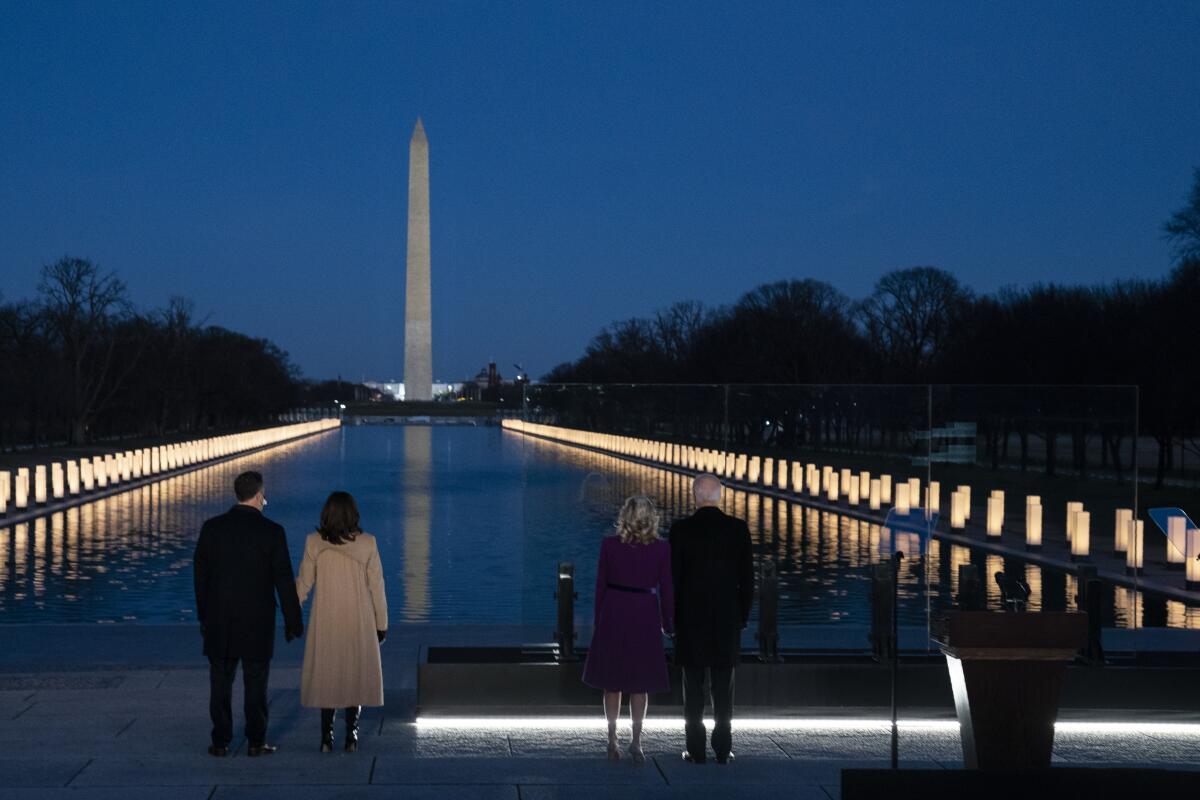
Biden at his Delaware farewell, held at the National Guard/Reserve Center named after his late son Beau Biden, paid tribute to his home state. After his remarks, he stopped and chatted with friends and well-wishers in the crowd, much like an Iowa rope line at the start of his long campaign journey.
“I’ll always be a proud son of the state of Delaware,” said Biden, who struggled to hold back tears as he delivered brief remarks.
After arriving in Washington, Biden went directly to an evening ceremony at the Reflecting Pool near the Lincoln Memorial to honor American lives lost to COVID-19. He was joined by Vice President-elect Kamala Harris, who spoke of the collective anguish of a nation.
No Mall crowd. No Pennsylvania Avenue stroll. Biden’s inauguration will be different in several ways
COVID-19, security threats and a boycott by the sitting president will make for an unusual inauguration ceremony this year.
“For many months we have grieved by ourselves,” Harris said. “Tonight, we grieve and begin healing together.”
Biden followed with his own brief remarks, telling Americans that “to heal we must remember.” As he spoke with 400 lights representing the pandemic victims illuminated behind him, he faced the statue of Abraham Lincoln, the Civil War president who served as more than 600,000 Americans died. As he turned to walk away at the conclusion of the vigil, he faced the black granite wall listing the 58,000-plus Americans who perished in Vietnam.
Inaugural organizers this week finished installing some 200,000 U.S., state and territorial flags on the National Mall, a display to represent the American people who couldn’t come to the inauguration, which is restricted under the tight security and COVID restrictions.
It’s also a reminder of all the president-elect faces as he looks to steer the nation through the pandemic with infections and deaths soaring.
Out of the starting gate, Biden and his team are intent on moving quickly to speed up the distribution of vaccinations to anxious Americans and pass his $1.9-trillion virus relief package, which includes quick payments to many people and an increase in the minimum wage to $15 an hour.
Biden also plans to unveil a sweeping immigration bill on the first day of his administration, hoping to provide an eight-year path to citizenship for an estimated 11 million people living in the U.S. without legal status. That would be a major reversal from the Trump administration’s tight immigration policies.
Clearing the 3-million case mark means roughly 1 out of every 13 Californians has been infected at some point during the pandemic.
Some leading Republican have already balked at Biden’s immigration plan. “There are many issues I think we can work cooperatively with President-elect Biden, but a blanket amnesty for people who are here unlawfully isn’t going to be one of them,” said Sen. Marco Rubio (R-Fla.), who is often a central player in Senate immigration battles.
But Biden’s legislative ambitions could be tempered by the hard truth he faces on Capitol Hill, where Democrats hold narrow majorities in both the Senate and House. His hopes to press forward with an avalanche of legislation in his first 100 days could also be slowed by an impeachment trial of Trump.
As Biden made his way to Washington, five of his Cabinet picks were appearing on Tuesday before Senate committees to begin confirmation hearings. Treasury nominee Janet Yellen, Defense nominee Lloyd Austin, Homeland Security nominee Alejandro Mayorkas, Secretary of State nominee Antony Blinken and Director of National Intelligence nominee Avril Haines were being questioned.
Yellen at her confirmation hearing urged lawmakers to embrace Biden’s virus relief package, arguing that “the smartest thing we can do is act big.”
Aides say Biden will use Wednesday’s inaugural address — one that will be delivered in front of an unusually small in-person group because of virus protocols and security concerns and is expected to run 20 to 30 minutes — to call for American unity and offer an optimistic message that Americans can get past this dark moment by working together. To that end, he extended invitations to Congress’ top four Republican and Democratic leaders to attend Mass with him at St. Matthew’s Cathedral ahead of the inauguration ceremony.
As Biden presses bipartisanship, he’s also facing pressure from his left to go big right away, with the progressive wing of the Democratic Party calling on Senate Democrats to help by doing away with the chamber’s filibuster.
“We are glad President-elect Biden is ready to start addressing the desperate needs of the American people and put forth a Covid aid proposal which begins to address the many issues we face,” the progressive groups Justice Democrats, Sunrise Movement and New Deal Strategies wrote in a memo on Monday. “We hope ten Senate Republicans will support it, but are not holding our breath. The big question is, what happens when Republicans block Biden?”
Ahead of Biden’s arrival, 12 U.S. Army National Guard members were removed from the presidential inauguration security mission after they were found to have ties with right-wing militia groups or posted extremist views online, according to two U.S. officials. There was no threat to Biden, they said.
The officials, a senior intelligence official and an Army official briefed on the matter, did not say which fringe group the Guard members belonged to or what unit they served in. The officials were not authorized to speak publicly and spoke to the Associated Press on condition of anonymity.
More to Read
Get the L.A. Times Politics newsletter
Deeply reported insights into legislation, politics and policy from Sacramento, Washington and beyond. In your inbox three times per week.
You may occasionally receive promotional content from the Los Angeles Times.
